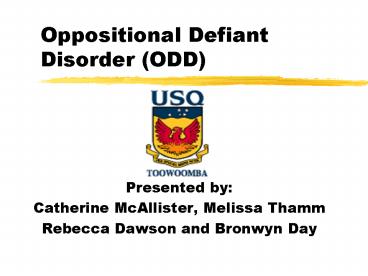Oppositional Defiant Disorder ODD - PowerPoint PPT Presentation
1 / 12
Title:
Oppositional Defiant Disorder ODD
Description:
Actively defiant and refusal to comply with adult requests and rules. Deliberate attempts to annoy or upset people ... or easily annoyed by others. Frequent ... – PowerPoint PPT presentation
Number of Views:292
Avg rating:3.0/5.0
Title: Oppositional Defiant Disorder ODD
1
Oppositional Defiant Disorder (ODD)
- Presented by
- Catherine McAllister, Melissa Thamm
- Rebecca Dawson and Bronwyn Day
2
Oppositional Defiant Disorder (ODD) is a pattern
of negative, hostile, disobedient and defiant
behaviour towards an authority figure. There is
a absence of violation in the social norms.
3
Symptoms
- Frequent temper tantrums
- Excessive arguing with adults
- Actively defiant and refusal to comply with adult
requests and rules - Deliberate attempts to annoy or upset people
- Blaming others for his or her mistakes or
misbehaviour's - Loss of friendship or trouble in school
4
Symptoms
- Often touchy or easily annoyed by others
- Frequent anger and resentment
- Mean and hateful when talking
- Spiteful or vindictive
- Swearing or using obscene language
- Low opinion of themselves
- May abuse drugs
- Angry and resentful of others
5
What causes ODD?
- The cause of Oppositional Defiant Disorder is
unknown at this time. The following are some of
the theories being investigated - It may be related to the childs temperament
and the familys response to that temperament - A predisposition to ODD is inherited in some
families - There may be problems in the brain that cause
ODD. - It may be cause by a chemical imbalance in the
brain
6
Who has ODD?
- 10 years and under - however this can develop
beyond this age - More prevalent in boys than girls
- 1 in 5 primary age students display ODD
characteristics (this can be influenced by
economical, racial and cultural factors)
7
What can we do as future educators?
- Always build on the positives, give the child
praise and positive reinforcement when they show
flexibility or cooperation. - Take a time-out break, if you are trying to make
the conflict worse. This is good modelling for
the child. - Support the child if they decide to take time-out
to prevent overreacting.
8
What can we do as future educators?
- Pick your battles. Since the child with ODD has
trouble avoiding power struggle, prioritise the
things you want the student to do. - Set up reasonable, age appropriate limits with
consequences that can be enforced consistently. - Obtain support from other teachers and support
staff - and always remember..
9
- Stay calm! Allow time to manage your own stress
and relaxation!
10
How can I obtain further information?
- School support (talk to colleagues)
- Guidance officer
- Scarce resources in the library etc - because it
its a relatively new disorder. - Most information on the Internet in medical
journals. Can be found - using most search engines.
11
Useful Web Sites for ODD
Children with Oppositional Defiant
Disorder http//www.aacap.org/publications/factsfa
m/72.htm Conduct Disorders http//www.conductdis
orders.com/ Teaching Students with Behavioural
Disorders http//www.provincialcec.on.ca/Resources
/Webresources/BDWR.htm ODD - What is
it? http//www.klis.com/chandler/pamphlet/oddcd/ab
out.htm
12
Lets go back.
- Using some of the recommended strategies in the
presentation, lets return to our classroom
setting and see the difference. The strategies
you will see (and use) have already been
implemented over a period of time.































